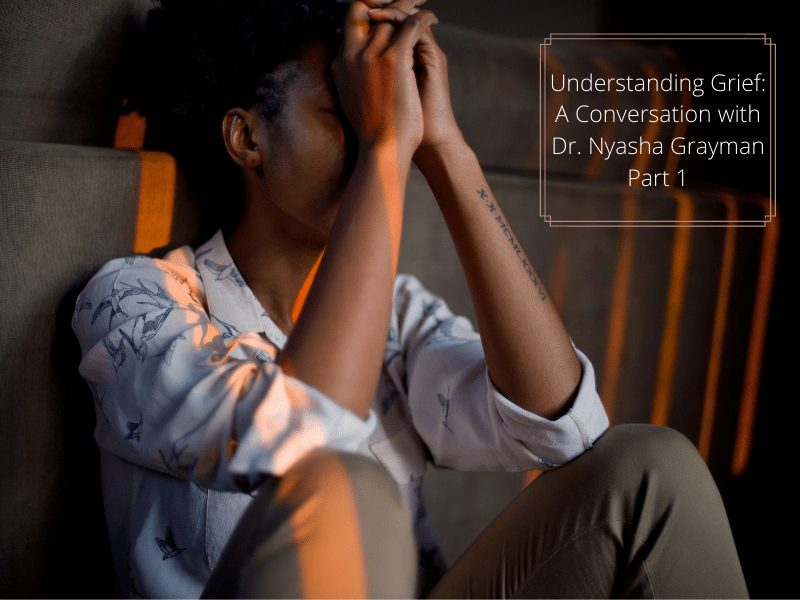Loss is an experience we will all have. MommiNation sat down with Dr. Nyasha Grayman, a bereavement therapist, to talk about grief, loss, and bereavement therapy. Dr. Grayman’s practice centers on grief, loss, and bereavement counseling with African American adults.
MommiNation: As a therapist you specialize in grief and bereavement counseling, what does that mean?
Dr. Grayman: So, grief and bereavement are a very broad umbrella that can relate to any major life transition where you’re experiencing a profound sense of rupture or heartbreak. My particular practice focuses exclusively on loss pertaining to death of a loved one. I work with humans who are experiencing grief in relation to the death of humans. And I’m making that distinction for the purposes of therapists who work with all kinds of life transitions, loss around job relocation, divorce, pet loss, etc. My practice focuses exclusively on human death.
One of the things that is really interesting about this work, though, is that you have to be very well versed in all manners of loss because, inevitably, they come up. So, while I’m not a divorce therapist, when someone comes to me for grief, if they’ve experienced divorce it’s going to come up. If they’ve experienced childhood trauma, it’s coming up. Grief brings everything up. Particularly unresolved childhood trauma.
MommiNation: How do you define grief?
Dr. Grayman: Grief and grief reactions exist on a continuum. One kind of grief is traumatic grief. And one of the distinguishing features of traumatic grief would be the suddenness of the event, like coming upon your loved one and seeing them dead. That’s something that’s liable to lead to flashbacks, intense fear, terror, and feeling of being terrorized. Those are all signs that the grief that you’re experiencing is not a regular life-transition kind of grief. And, if that kind of grief not attended to, it’s not going to heal itself with time in the way we typically think grief does.
MommiNation: How do you distinguish between grief and trauma?
Dr. Grayman: I think of grief as a type of trauma that is specifically relational. It’s a relational rupture that’s irreparable on some level. Trauma, I think of, very broadly, as any experience in which the system is overwhelmed and cannot digest or manage. It’s a flooding. It’s a form of being overwhelmed. It’s like a short circuit of your system.
MommiNation: So, relational ruptures lead to grief. But it’s when grief overwhelms my coping capacities that the grief is considered traumatic.
Dr. Grayman: Right.
MommiNation: What surprises people about grief?
Dr. Grayman: I think that similar to what C. S. Lewis said, people are most surprised that grief can feel so much like fear— intense fear, terror, anxiety, and that the experience can very much mimic a lot of the symptoms of traumatic stress or post-traumatic stress.
MommiNation: What has surprised you about people’s particularly Black women’s experience of grief and loss?
Dr. Grayman: I think one thing that has surprised me is the extent to which the research literature shows up in Black women’s experience. There’s a lot of struggle around the Superwoman complex, and a lot of battling around being vulnerable and surrendering to the experience of grief. They’re looking like they’re holding it all together, but there is a vulnerability that they’re willing to express with me. I’ve also been pleasantly surprised by Black women’s receptivity to non-verbal body-based interventions or creative interventions.
MommiNation: What is the Super Woman Complex?
Dr. Grayman: It is based in a racist narrative trope of Black women being able to endure pain and suffering, so they can be worked like mules, and they can nurse their children, they can nurse your children, they can pick cotton, they can work, they can do everything. I think that over time, we have internalized that as a badge of honor, and we’ve glorified this ability to be long suffering and stoic, and taking care of business, and very high powered. It serves us in some ways. But, anything out-of-balance ends up being a liability.
MommiNation: What has your practice revealed about the ways Black women manage loss?
Dr. Grayman: I think that we as Black women have a lot of good interventions that we use instinctually. I think it is important for people to know that they already have a lot of the coping skills. What I do is help them to understand how particular coping techniques are actually helping so that there can be more intentionality, more mastery, and more facility around how they’re using the skills they’re using. I help them understand when they’re overusing particular skills and help them think about the importance of balance. We don’t need to throw out what we’ve been practicing for millennia. We can marry it with what we know in terms of scientific evidence around how and why the things we are doing are actually bringing some relief.
Bio: Dr. Nasha Grayman is owner and operator of Wisdom Counseling, Baltimore LLC, which is a boutique grief and bereavement therapy practice in Baltimore County, MD. Dr. Grayman is also an Endowed Professor and an Associate Professor of Psychology and Africana Studies at a Baltimore area liberal arts college.
Links referenced:
Dr. Grayman’s Wisdom Counseling, https://www.wisdomcounseling-baltimorellc.com/about-dr-nyasha-grayman/








Leave a Reply